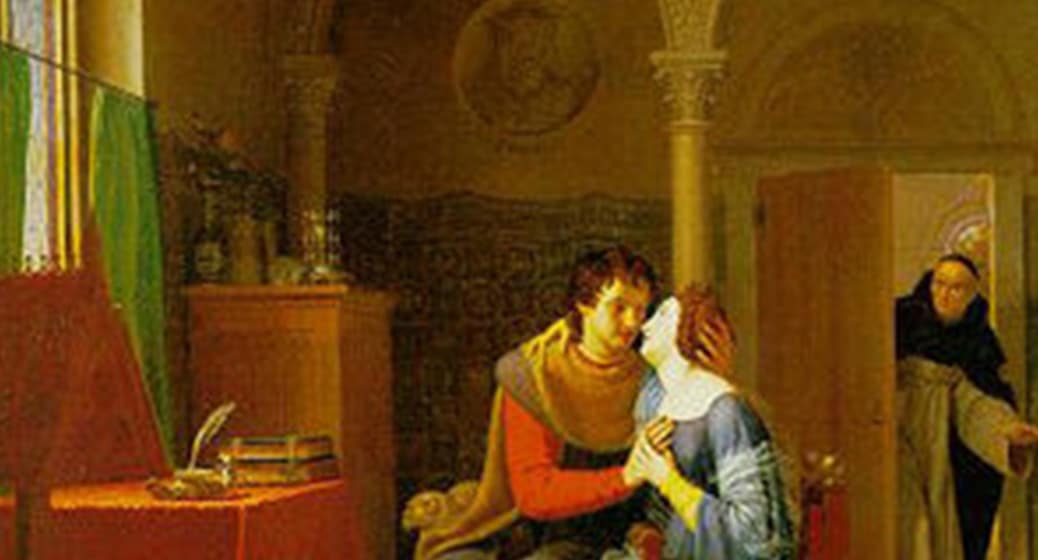Eloise stabbed at her salad. “Peter can be such an ass sometimes.” My intelligent, warm, and lovely niece was gracing me with her delicious presence during her end-of-year holiday break. She’s a very grounded person, and I was not accustomed to seeing her upset.
I see the anguish on her face. “So it’s going that well, huh?
She glares back at my failed humor. “We’d agreed to live together when we graduate in June.” She pierces a cherry tomato with her fork, then squishes it flat. “Now he’s backing out. Also, he’s started to tease me by calling me ‘Heloise.'”
“Who?” I cock my head at her.
“You know, Heloise and Abelard. The 12th-century French intellectuals who fell madly in love. Peter sees their story as so romantic.”
“And, he wants you to be Heloise to his Pierre?”
“How’d you know?” Eloise sighs. “Yes. Yes. Like their torrid love story…
“Our love story was torrid, at first. Very hot.” She looks at me, imploringly. “But our feelings have shifted over these two years. We see each other’s warts now. I accept his. But I feel that he does not accept mine. Heck, I accept his leaving his socks on the bathroom floor. Why does it rattle him when I forget to hang up my jacket?“ Eloise barely takes a breath. “He says he doesn’t always feel happy with me. He’s not sure I’m ‘the one.’ What the hell does that mean?” She crushes another cherry tomato, its ripeness bursting beneath her question.
“When you first met, you looked so well suited for one another.”
“Well, I thought so too. We’re both smart and talk fast,” Eloise chuckles slightly. “We like to share our thoughts. We have similar values. But time shifts perception. We have our moments when we misread one another. We get out of sync. He has some ideal of Perfect Love in his mind. It’s like every moment has to be magic.”
“Sounds to me like every moment has to be hot sex. Maybe that’s what feels like magic?” I raise my eyebrows at Eloise.
“Well, that dopamine rush does feel magical when you’re in it,” Eloise softly laughs.
“Look,” I said. “I think the wish for an idealized Perfect Love is really a euphemism for hot sex. It’s great to feel, but lust doesn’t usually last. It shifts, like you say. It shifts with time. It’s really a myth. I mean, think of the stories of Tristan and Isolde, a Celtic tale dating way back to the 1000s BC. Then Heloise d’Argenteuil and Peter Abelard—Shakespeare canonized these ‘star-crossed’ lovers in his tale of Romeo and Juliet.
“You mean lust at first sight. Lust is great. Enjoy it. But don’t call it love. Let alone Perfect Love.” I paused. “And…and let’s not pretend to call Perfect Love the road to ‘happiness.’ How about we call it the tyranny of the myth of Perfect Love?”
We both laugh. Eloise stops, again fork midair. “Come to think about it. I saw my parents fight. But they always made up. They didn’t always agree. But I knew they loved each other by how they respected, even accepted, their differences. Peter only saw his parents fighting, until they divorced.”
I nod. “You can make a good case that romance novels, schmaltzy movies, even famous operas, and these tales of torrid forbidden love do us a disservice. They show a tale of passion into the ‘happily ever after.’ But this is really a myth of Perfect Love. It’s not an exciting tale to show the complexity of what it takes to hold a lasting loving partnership. One like your parents’.”
Eloise pushed back. “But Heloise and Abelard’s love lasted their lifetime.”
“I’d reframe that to say that their love changed once they exiled themselves into their separate abbey and monastery. Their initial lust was memorialized in their famous letters, but they also wrote each other about spiritual interpretations…”
Eloise interrupted me. “So what do I do?”
“Well….” I stop. “You might start by asking him if he knows the full story of Heloise d’Argenteuil and Pierre Abelard. Yes, sure, the philosophy teacher and his much younger brilliant student had a delicious and lustful affair. When she got pregnant, he sent her to his sister’s to have their son. Reluctantly, she agreed to marry him. That’s the first half of the story that Peter likely knows.
“They’re all lovers struggling with the traditions of their cultures, and pushing back against the norms of authority figures — like parents, kings, and the church. Do you ever wonder — the more doomed their love the more passionate the narrative describes them?”
“I never thought of it that way….I mean, Peter is mesmerized by all those love-at-first-sight operas…”
“Maybe remind him about the second half of the story, the painful heart-breaking half. When Heloise’s uncle, or guardian, Fulbert discovered the marriage and the child, he hired thugs to assault Pierre and castrate him. In great shame, Pierre then exiled himself to Brittany where he lived as a monk. Heloise gave up her son (apparently) and became a nun, and later the abbess, of the Oratory of the Paraclete. They lived apart the rest of their days. I doubt that’s what you want for your relationship. Forbidden, or even Perfect Love, no matter how passionate, didn’t get these lovers to ‘happiness.’”
And I add, “If they weren’t so smart, and such prolific letter writers, we might not have known their roller-coaster feelings of sensuality and longings along with their guilt and remorse. The tragic second half of the story may help him to adjust his own idealized view of what he wants love to be — but it can’t stay perfectly frozen in time.”
“Mm-m-m. I don’t want to end up in a nunnery. And Peter is no monk.” Eloise swallows the final leaves of lettuce with the last cucumber slice. Thoughtfully removing the fork from her mouth, she smiles at me. “There may be no Perfect Love. But I’ll bet there are perfect chocolate chips in those brownies I brought you! Let’s try one!”
Keep Reading
Want more? Here are some other blog posts you might be interested in.







